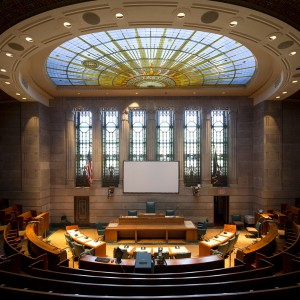05 May Supreme Court Rules That Town’s Prayer Practice Is Constitutional
The Supreme Court has released its decision in Town of Greece v. Galloway,  concluding that the Town’s prayer practice has a “permissible ceremonial purpose” and is “not an unconstitutional establishment of religion.”
concluding that the Town’s prayer practice has a “permissible ceremonial purpose” and is “not an unconstitutional establishment of religion.”
Writing for the Court, Justice Kennedy ruled that the Town’s prayer practice “fits within the tradition long followed in Congress and the state legislatures.”
Some highlights from his opinion:
An insistence on nonsectarian or ecumenical prayer as a single, fixed standard is not consistent with the tradition of legislative prayer outlined in the Court’s cases.
To hold that invocations must be nonsectarian would force the legislatures that sponsor prayers and the courts that are asked to decide these cases to act as supervisors and censors of religious speech, a rule that would involve government in religious matters to a far greater degree than is the case under the town’s current practice of neither editing or approving prayers in advance nor criticizing their content after the fact.
Once it invites prayer into the public sphere, government must permit a prayer giver to address his or her own God or gods as conscience dictates, unfettered by what an administrator or judge considers to be nonsectarian.
[T]he Court does not imply that no constraints remain on its content. The relevant constraint derives from its place at the opening of legislative sessions, where it is meant to lend gravity to the occasion and reflect values long part of the Nation’s heritage. Prayer that is solemn and respectful in tone, that invites lawmakers to reflect upon shared ideals and common ends before they embark on the fractious business of governing, serves that legitimate function. If the course and practice over time shows that the invocations denigrate nonbelievers or religious minorities, threaten damnation, or preach conversion, many present may consider the prayer to fall short of the desire to elevate the purpose of the occasion and to unite lawmakers in their common effort. That circumstance would present a different case than the one presently before the Court.
So long as the town maintains a policy of nondiscrimination, the Constitution does not require it to search beyond its borders for non-Christian prayer givers in an effort to achieve religious balancing.
The Court is not persuaded that the town of Greece, through the act of offering a brief, solemn, and respectful prayer to open its monthly meetings, compelled its citizens to engage in a religious observance. The inquiry remains a fact-sensitive one that considers both the setting in which the prayer arises and the audience to whom it is directed.
It is presumed that the reasonable observer is acquainted with this tradition and understands that its purposes are to lend gravity to public proceedings and to acknowledge the place religion holds in the lives of many private citizens, not to afford government an opportunity to proselytize or force truant constituents into the pews.
The principal audience for these invocations is not,indeed, the public but lawmakers themselves, who may find that a moment of prayer or quiet reflection sets the mind to a higher purpose and thereby eases the task of governing.
The analysis would be different if town board members directed the public to participate in the prayers, singled out dissidents for opprobrium, or indicated that their decisions might be influenced by a person’s acquiescence in the prayer opportunity.
Respondents stated that the prayers gave them offense and made them feel excluded and disrespected. Offense, however, does not equate to coercion. Adults often encounter speech they find disagreeable; and an Establishment Clause violation is not made out any time a person experiences a sense of affront from the expression of contrary religious views in a legislative forum, especially where, as here, any member of the public is welcome in turn to offer an invocation reflecting his or her own convictions.
Justice Kagan authored the principal dissent. In her view, the Town could have a prayer practice but:
Greece could not do what it did: infuse a participatory government body with one (and only one) faith, so that month in and month out, the citizens appearing before it become partly defined by their creed—as those who share, and those who do not, the community’s majority religious belief. In this country, when citizens go before the government, they go not as Christians or Muslims or Jews (or what have you), but just as Americans (or here, as Grecians). That is what it means to be an equal citizen, irrespective of religion.
More coverage soon. See our previous coverage here and here.
Image courtesy of Flickr by sah1365 (creative commons, no changes made)



